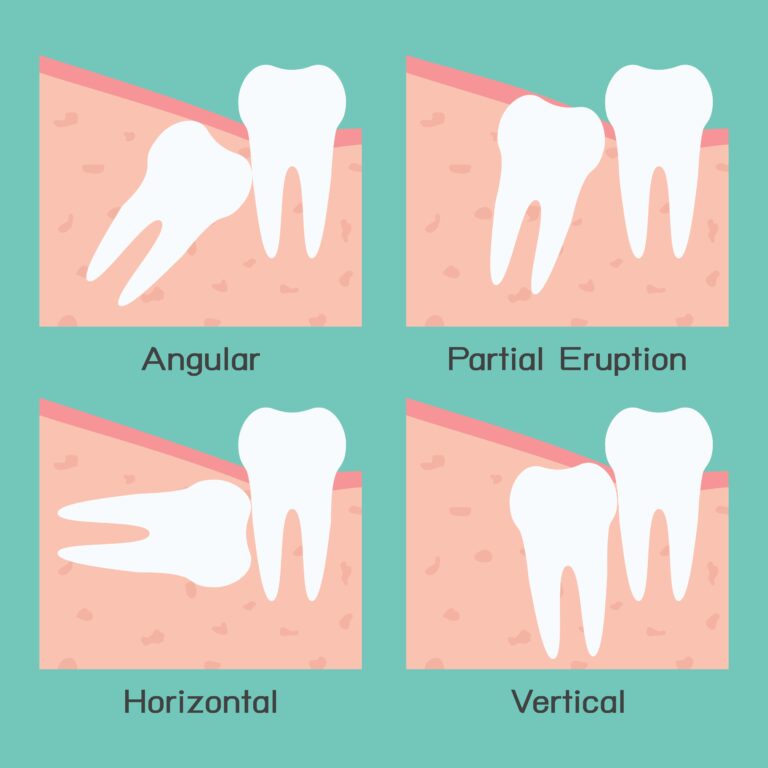
Imagine a rite of passage in early adulthood that’s neither glamorous nor necessarily joyous. Yes, we’re talking about the arrival of your wisdom teeth.
The wisdom tooth, or third molars as they’re officially known, commonly known as the wisdom teeth, can be a literal pain in the mouth of many individuals. In recent decades, the removal of wisdom teeth have become somewhat of a standard practice. Often impacted or misaligned, these teeth can cause an array of complications, from pain to crowding, and even infection.
To mitigate these potential issues, many are advised by their dentist to have them removed, even when the teeth aren’t currently causing problems. It is estimated that in the United States, over $3 billion a year were spent to have 10 million wisdom teeth removed.
But like any surgical procedure, wisdom teeth extraction isn’t without its downsides. Beyond the immediate post-surgery discomfort, there are potential risks and complications that may arise. In the rest of this article, we will shed light on the less-talked-about disadvantages of wisdom teeth removal. From dry socket to nerve damage, and the rare but potential risk of general anesthesia, we will unpack the disadvantages, detailing the impacts and complications that can arise.
Why Remove Wisdom Teeth?

While not everyone requires wisdom teeth extraction, there are several compelling reasons why dental experts may recommend their removal. Understanding these reasons can help individuals make informed decisions and ensure the long-term health and well-being of their mouths.
Here are some common situations where wisdom teeth removal is advised by your dentist:
- Insufficient Space: In many cases, the jaw does not have enough room to accommodate the eruption of wisdom teeth. As a result, these teeth may grow at an angle or become impacted, meaning they are unable to emerge fully from the gum line. There are four types of wisdom tooth impaction: mesial (angular), distal (partial), vertical, and horizontal impactions. Due to its unnatural position, an impacted wisdom tooth can cause a variety of problems, including pain, infection, and damage to surrounding teeth.
- Difficulty in Cleaning: Due to their location at the back of the mouth, wisdom teeth can be challenging to clean effectively. Their position makes it harder to reach them with a toothbrush or dental floss, increasing the likelihood of plaque buildup, tooth decay, and gum disease. Removing these teeth simplifies oral hygiene and reduces the risk of future dental issues.
- Minimize Risk of Gum Disease: Partially erupted or impacted wisdom teeth can create pockets of space between the gum tissue and the tooth surface, providing an ideal environment for bacterial growth. This can lead to infections, such as pericoronitis (inflammation around the tooth) or gum disease (periodontitis). Removing wisdom teeth in such cases helps prevent recurrent infections and gum problems.
- Undergoing Orthodontic Treatment: For individuals undergoing orthodontic treatment, the presence of wisdom teeth can complicate the process. These additional molars may exert pressure on the existing teeth, causing them to shift or undoing the progress made with braces or aligners. Removing wisdom teeth can aid in achieving optimal orthodontic outcomes.
- Prevention of Future Issues: Even if wisdom teeth are not causing immediate problems, their potential to cause issues in the future may prompt dental professionals to recommend their removal as a proactive measure. By removing them before complications arise, individuals can avoid potential pain, infection, and damage to surrounding teeth.
Despite these reasons, not all wisdom teeth need to be removed. A study published in 2020 revealed that there is inconclusive evidence to determine if asymptomatic, disease-free impacted wisdom teeth should be removed. This suggests that there is no need to remove your impacted wisdom tooth as long as it is not causing any pain or dental problem.
You may be interested in: What Are The Benefits Of Keeping Wisdom Teeth?
Disadvantages of Removing Wisdom Tooth
While removing wisdom teeth can prevent and address various dental issues, like impaction, infection, and crowding, it also comes with potential disadvantages and risks.
- Pain and discomfort: The extraction site can be sore and tender for several days after the procedure. Furthermore, for some time after the extraction, some may experience temporary trismus, or difficulty opening their mouth. Most of this pain and discomfort can be alleviate with pain medication and will usually go away within 24 to 72 hours after the surgical procedure.
- Risk of dry socket: There is a small risk of complications such as infection, dry socket (alveolar osteitis), or nerve damage. Dry socket is a complication that occurs when the blood clot that is formed in the hole of the removed wisdom tooth is dislodged. This exposes the nerves and bones to the elements of the mouth, causing severe pain, nausea, and a bad taste.
- Risk from anesthesia: Most wisdom tooth extractions involve some form of anesthesia. While complications are rare, reactions can range from minor side effects like nausea and dizziness to more serious conditions like an allergic reaction or breathing difficulties.
- Risk of long term complications: While wisdom teeth removal is generally safe, there are rare cases where patients suffer from some form of long-term complications such as numbness, increased sensitivity, and damage to the surrounding molars.
- Slight change in speech: In some cases, people may experience slight change in speech due to swelling or numbness caused by the procedure. This can be temporary, but in some cases, the change can be permanent.
- Temporary changes in sensation: Nerve injury during the extraction procedure is rare but can potentially lead to temporary or, in rare cases, permanent changes in sensation. Numbness or tingling in the lips, tongue, or cheeks may occur due to nerve irritation or damage. However, most cases of altered sensation resolve over time.
- Risk of sinus issues: Wisdom teeth extraction can cause sinus issues due to the proximity of the teeth to the sinus cavity. This can result in sinus pressure, pain, or difficulty breathing.
- Soft diet for a week: After the removal of your wisdom teeth, the extraction sites may be sensitive, and chewing hard or crunchy foods can cause discomfort or disrupt the healing process. You are advised to undergo a soft diet and avoid certain food to give time for your surgical wound to recover. This limitation on food choices can be inconvenient and may result in dietary restrictions, impacting enjoyment of meals and nutritional intake.
- Time off from work or school: The recovery period following the procedure typically involves a few days to a week of limited activity, including rest, dietary restrictions, and discomfort management. This may require taking time off from work or adjusting work schedules, which can be challenging for individuals who cannot afford extended breaks or have demanding professional commitments.
- High cost: Depending on various factors, such as the complexity of the procedure, the need for sedation or anesthesia, and whether or not you have dental insurance, the cost of wisdom tooth removal can be significant. It is important to consult with your dentist or oral surgeon to understand the potential costs involved and explore any insurance coverage available.
While these disadvantages might seem daunting, remember that they represent potential risks and are not guaranteed to happen. Most people have their wisdom teeth removed with little to no significant complications. As with all medical procedures, the specific risks, benefits, and alternatives to wisdom tooth removal should be discussed with your dentists.
Should You Remove Your Wisdom Tooth?
With the list of 10 disadvantages listed above, you should have a clear idea about the catch involved when removing your wisdom teeth. Understanding the potential disadvantages of wisdom teeth removal helps you to make an informed decision about whether or not to proceed with the dental procedure.

It is worth reminding that not all wisdom teeth require removal. The dentition of everyone is unique and particular, and the decision to remove your wisdom teeth is typically based on whether they are causing problems or are likely to cause problems in the future. If they are fully erupted but are not causing any problems, it’s best to leave them alone.
However, if the wisdom teeth are causing pain or discomfort, this is a clear indication that they need to be removed. Impacted or partially erupted wisdom teeth can cause health risk if they are not dealt with promptly. They can also be difficult to clean properly, increasing the risk of decay or gum disease.
Ultimately, the decision to remove wisdom teeth is not a one-size-fits-all approach and should be made on an individual basis. It is important to have a thorough discussion with your dental professional to understand the specific circumstances surrounding your wisdom teeth. Consult your dentist or oral surgeon who can evaluate your individual case and provide an expert opinion based on the current state of your wisdom tooth.
Still unsure? Take our short quiz here to determine if you need to have your wisdom teeth removed!
Takeaway
In conclusion, while wisdom tooth removal can be a necessary dental procedure for many individuals, one must be aware of the potential disadvantages involved. Surgical risks, including infection, bleeding, nerve damage, and adverse reactions to anesthesia, are possible but rare occurrences. Temporary changes in sensation and the possibility of surgical complications are also factors to consider.
Understanding these drawbacks doesn’t necessarily mean you should avoid the procedure altogether. Rather, it underscores the importance of discussing with your dental professional the best strategy for your specific circumstances, ensuring that you are not just following a general trend, but rather choosing what’s right for your oral health.
Remember, knowledge is power when it comes to making decisions about your oral health, and we hope that we have equipped you with the information you need to make an informed choice about whether to remove your wisdom tooth.






